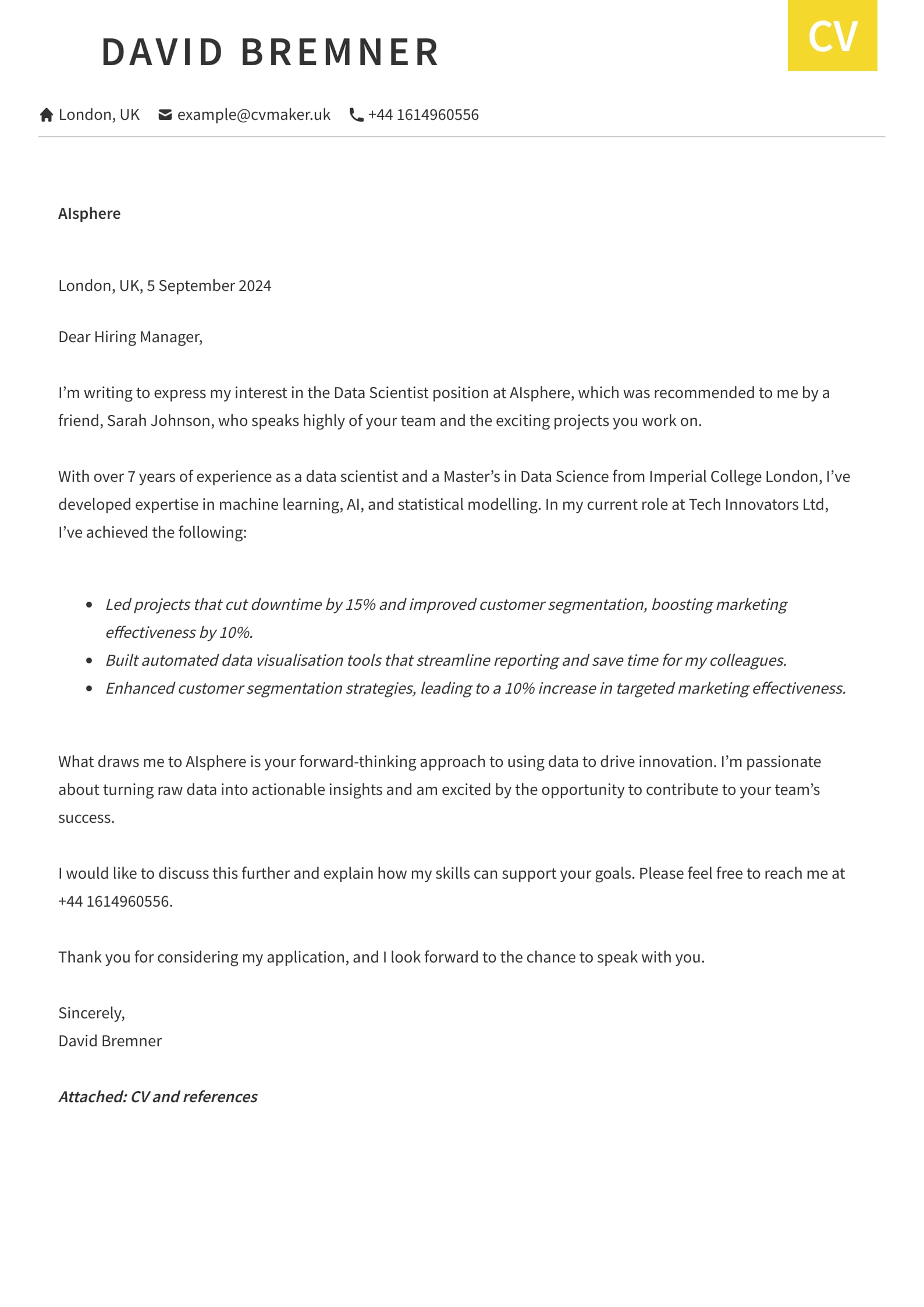
How to Write a Data Scientist CV: Examples and Writing Tips
In today's data-driven era, the role of data scientists has evolved across various industries, sparking a surge in demand for skilled tech experts and revealing a multitude of enticing prospects. With this role continually shaped by advancements in AI technology, the need to write a modern CV aligned with the latest trends is essential.
Just as analysing intricate data demands precision, selecting a professional CV template requires attention to detail, ensuring it accurately showcases your expertise, skills, and qualifications. The rapid advancement of AI technology also significantly influences the approach to writing a good CV that resonates with industry professionals. Tailoring CVs with a data-driven focus optimised for applicant tracking systems (ATS) has become essential for recruiters in this current job market.
Data scientist CV example

Download this sample CV for a data scientist job in the UK
In this data scientist CV example, David Bremner presents his seven years of experience excelling in AI and machine learning. His relevant skills in statistical modelling, analysing data and implementing ML models showcase her proficiency. The work experience section and notable achievements prove his ability to collaborate on data integrity, forecasting models, and diverse methodologies, fostering innovation and problem-solving. He is eager to specialise further in AI, and the data scientist CV template uses Otago, which ensures clarity and organisation, making it easy to read and look professional.

Pro Tip
Tailor each section to highlight your expertise and career goals. Read the job description and use keywords highlighted by the employers.
Do you need a cover letter? Check out our matching data scientist cover letter example to help you streamline your application.
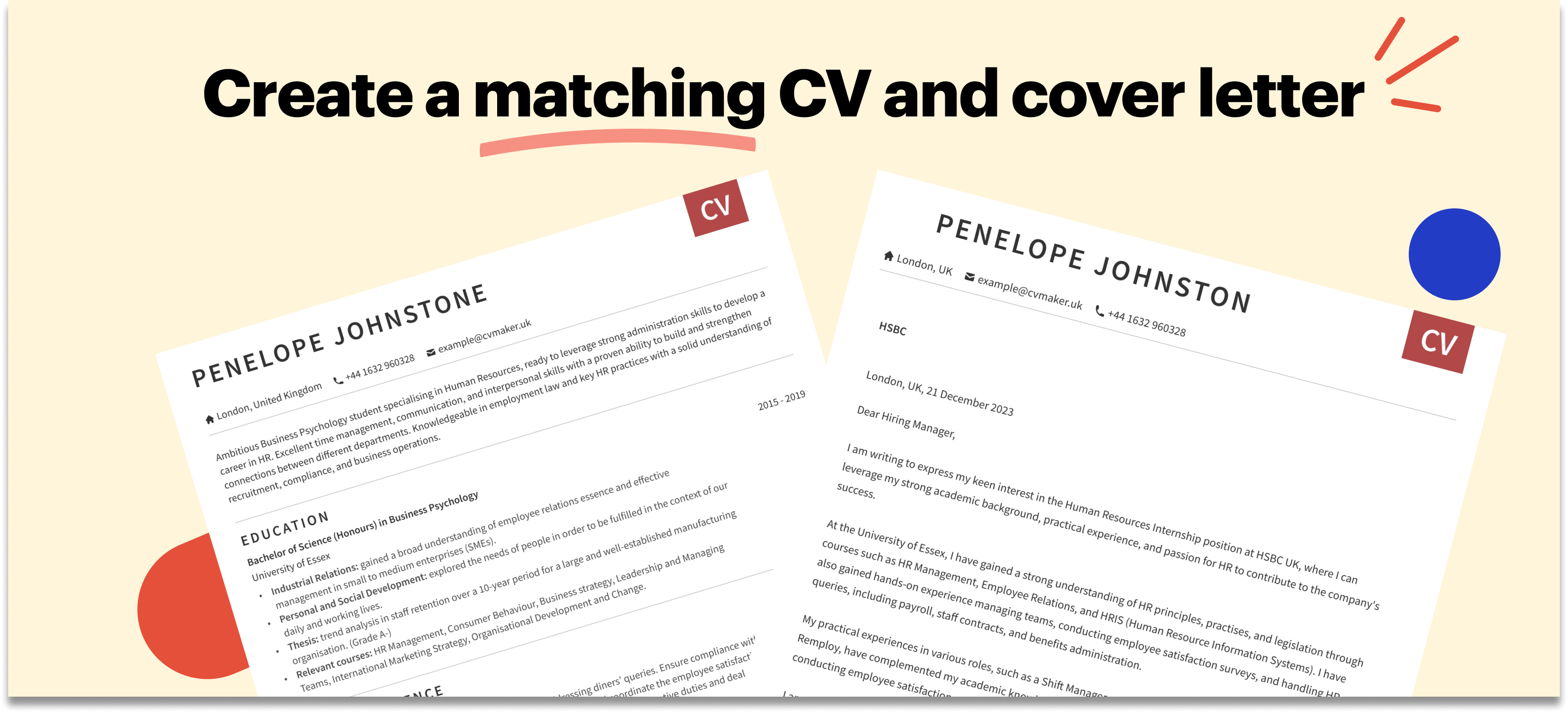
What to include in a data scientist CV?
To write the best CV for a data scientist, you must use a data-driven approach to consider the latest industry advancements, such as programming languages, statistical tools, machine learning techniques and the impact of AI technology.
At the top of your CV, include a brief personal statement tailored to match your expertise and career goals, as well as up-to-date contact information.
Showcase impactful work experience highlighting achievements in bullet points, tasks and any data science projects, followed by a technical and soft skills section.
List relevant qualifications in an education section, such as degrees, specialised courses and certificates.
Using an additional section to present hobbies and interests, such as industry conferences, webinars, or workshops, is optional.

Explore the CV writing process and where to start for more guidance on how to write a master CV and then tailor it for each job application.
How to write a personal profile for a data scientist CV
Your data science CV summary is an opportunity to present your expertise, aspirations, and unique attributes. It should highlight your passion for data-driven insights, technical abilities and industry knowledge. If you're a recent graduate or junior scientist with little to no experience, express clear objectives in handling data and conducting research, utilise analytical tools to extract insights from complex datasets and be willing to make decisions for businesses or organisations.
Junior Data Scientist CV Personal Profile
A passionate and driven junior scientist with a solid 1-year foundation in data analysis, proficient in Python, SQL, and data visualisation. Excited to apply academic learning and insights gained from self-taught courses to real-world challenges. Demonstrating adept problem-solving skills and a commitment to leveraging these abilities to make impactful decisions benefiting businesses or organisations.
Graduate Data Scientist CV Personal Profile
Dedicated graduate with 2 years of immersive experience in machine learning, data modelling, and statistical analysis. Proficient in R, Python, and TensorFlow, actively involved in impactful projects throughout academic projects and internships. Aspiring to apply gained knowledge to tackle real-world challenges, dedicated to adaptability in leveraging data for actionable insights, and enthusiastic about crafting innovative strategies to optimise businesses and drive growth.
Learn more about how to write a graduate CV.
Entry-Level Data Scientist CV Personal Profile
Aspiring entry-level scientist adept in data-driven decision-making, predictive modelling, and implementing ML algorithms. One year of experience in cloud computing, Big Data technologies, and deep learning frameworks like Keras. Demonstrates a track record of solving complex business challenges and driving innovation through data-centric strategies.
Senior Data Scientist CV Personal Profile
Experienced Senior Data Scientist with 10+ years of expertise in advanced data analysis and machine learning. Proven track record in delivering innovative solutions, optimising operations, and driving business growth. Proficient in leading cross-functional teams, leveraging cutting-edge technologies to extract actionable insights. Passionate about pushing the boundaries of data science for impactful outcomes across diverse industries.
Learn how to write a compelling personal profile on a CV that aligns with your career goals.
What are the skills required for a data scientist CV
A well-structured skills section on a data science CV encompasses technical proficiencies (hard skills), data visualisation tools, and top soft skills. Highlighting domain-specific finance, healthcare, or IT expertise can showcase a comprehensive and targeted skill profile for potential employers.
If you’re targeting junior roles or are a school leaver with little to no work experience, consider enrolling in a program to gain skills through specialised boot camps and writing a skills-based CV to impress potential employers.
| Soft skills | Hard skills |
|---|---|
| Problem-solving | Artificial intelligence |
| Critical thinking | Data analysis |
| Adaptability | Statistical analysis (e.g., R, Python for statistics) |
| Communication | Presentation |
| Teamwork | Data visualisation (e.g., Tableau, Power BI) |
| Time management | Statistics and probability |
| Curiosity | Deep learning |
| Attention to detail | Cloud computing (e.g., AWS, Azure) |
| Creativity | Machine learning (e.g., TensorFlow, Scikit-learn) |
| Resilience | Regression analysis |
| Ethical considerations | Programming languages (Python, R). |
Pro Tip
Avoid overloading this section and be selective. Prioritise the most relevant and impactful skills for the specific job you're targeting.
Refer to these examples for roles with evolving and technical skills:
For more ideas on what to include in your skills section, read our article on what skills to put on a CV.
How to include work experience on a data scientist CV
When detailing work experience, use a chronological format and include job titles, company names, locations, and dates. Prioritise achievements over responsibilities, using bullet points to highlight measurable outcomes and quantify results to show impact.

Work experience examples
Junior Data Scientist, Tech Solutions Ltd, London, UK, 2021 - Present
Employ Python and SQL for thorough data cleaning, analysis, and machine learning. Collaborate with senior team members to conduct statistical analyses and construct machine learning models, contributing to robust data-driven decision-making processes within the team.
Streamlined data cleaning processes and reduced error rates by 15%.
Contributed to a 10% improvement in predictive accuracy for customer behaviour analysis.
Entry-Level Data Scientist | Analytics Innovations | Manchester | 2020 - Present
Conduct exploratory data analysis using R and Python, identifying trends and anomalies. Assist in developing and implementing machine learning models for predictive analysis. Collaborate with cross-functional teams to refine data collection methodologies.
Implemented an optimised data collection method, resulting in a 20% increase in accuracy rates.
Developed an automated data visualisation tool, reducing report generation time by 30% and improving stakeholder accessibility.
Lead Data Scientist | Data Insights Agents | London | 2018 - Present
Lead a team of data scientists in developing and deploying complex machine-learning models. Spearhead data analysis initiatives using advanced statistical techniques and deep learning algorithms. Collaborate with stakeholders to align data science strategies with business objectives, driving innovation and actionable insights.
Led a project resulting in a 25% increase in customer retention through personalised recommendation systems.
Implemented an AI-driven anomaly detection system, reducing errors in data processing by 20%.
Data science CV work experience example with little to no experience
Volunteer | DataKind UK | Birmingham | 2020 - 2022
Volunteered with machine learning and statistical analysis expertise to aid in data collection and analysis for a charitable initiative through DataKind UK. Collaborated closely with senior data scientists to develop and implement models for impactful insights. Actively pursued self-directed learning, acquiring proficiencies in Python and data visualisation tools like Tableau, actively contributing to business objectives.
Improved a sentiment analysis model, elevating accuracy by 15% through data preprocessing techniques.
If you have little to no work experience or are entering the workforce after graduating, internships or volunteering opportunities focusing on data analysis, machine learning, or statistical modelling are beneficial. Many companies, including tech firms, financial institutions, healthcare organisations, and consultancies, run graduate programs or schemes that provide structured training, mentorship, and hands-on experience.
For more information on this section, refer to our article on how to write work experience.

Enhance your CV with an education section
With the rise of specialised boot camps and fast-track programs in the UK, there’s an accelerated path into this competitive field that complements traditional academic routes.
Obtaining secondary-tier qualifications in maths, statistics, computer science, or an undergraduate degree benefits aspiring professionals. If qualified in other areas, consider a postgraduate masters conversion course.
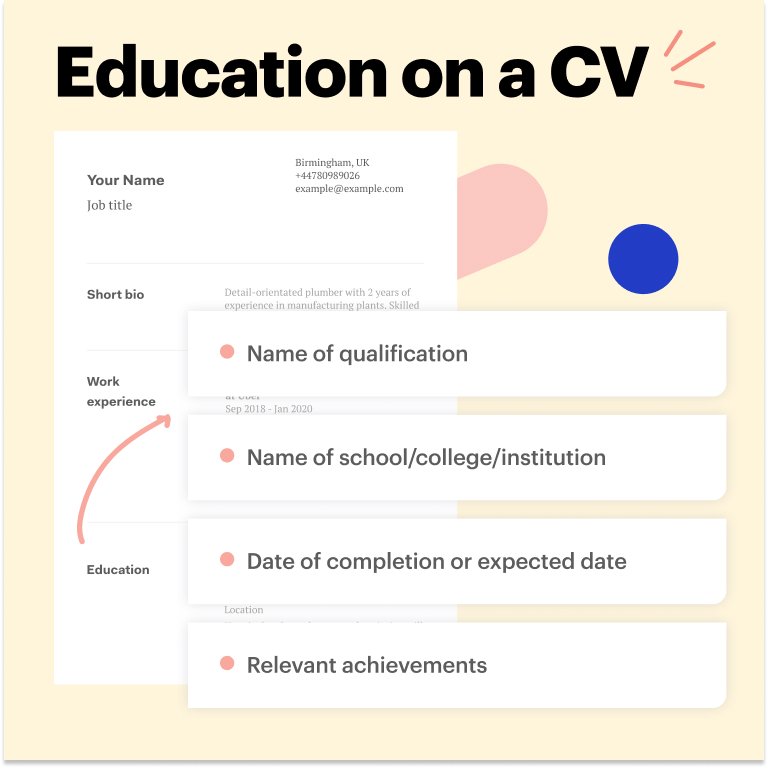
If you are a student without experience, use hands-on projects, coursework, academic achievements, or complete an apprenticeship to leverage your data scientist CV.
Education examples:
Master of Science in Data Science and Machine Learning, University of Manchester, 2022.
Postgraduate Certificate in Applied Data Science, Imperial College London, 2021.
Bachelor of Science in Computer Science, University of Edinburgh, 2019.
For more examples, refer to our blog on mastering the CV education section.
How to include certifications on a data scientist CV
When listing courses and certificates in your CV, include the complete course title, issuing bodies, and completion dates. Highlight certifications related to crucial data analysis tools like SQL, Python, or R, covering essential languages or frameworks in data analysis. Develop your knowledge of key areas to significantly enhance your career prospects with programs such as coding boot camps and evolve your skills in specific tech-driven sectors such as construction or civil engineering.
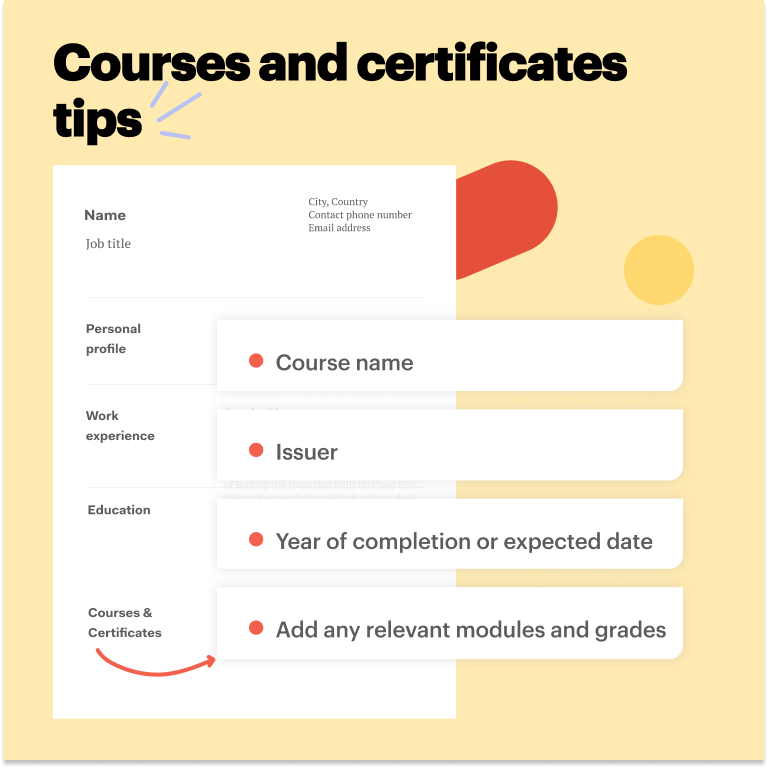
Examples:
Data Science Certification, Coursera, 2022
Covered machine learning algorithms, statistical analysis, and data visualisation techniques using Python and Tableau.
SQL for Data Science, Microsoft, 2021
Explored advanced SQL queries, database management, and data manipulation for analytical purposes.
R Programming Certification, DataCamp, 2020
Mastered R programming fundamentals and applied statistical techniques in data analysis projects.
Key takeaways
Creating the best data scientist CV example requires a strategic approach and improving your CV to meet the demands of a competitive job market. Showcasing technical expertise, gaining educational qualifications, and highlighting proficiency in essential programming software or tools are vital. Even without experience, you can easily enhance your CV with transferable skills, apprenticeships, or boot camp skill courses to fast-track your career opportunities.
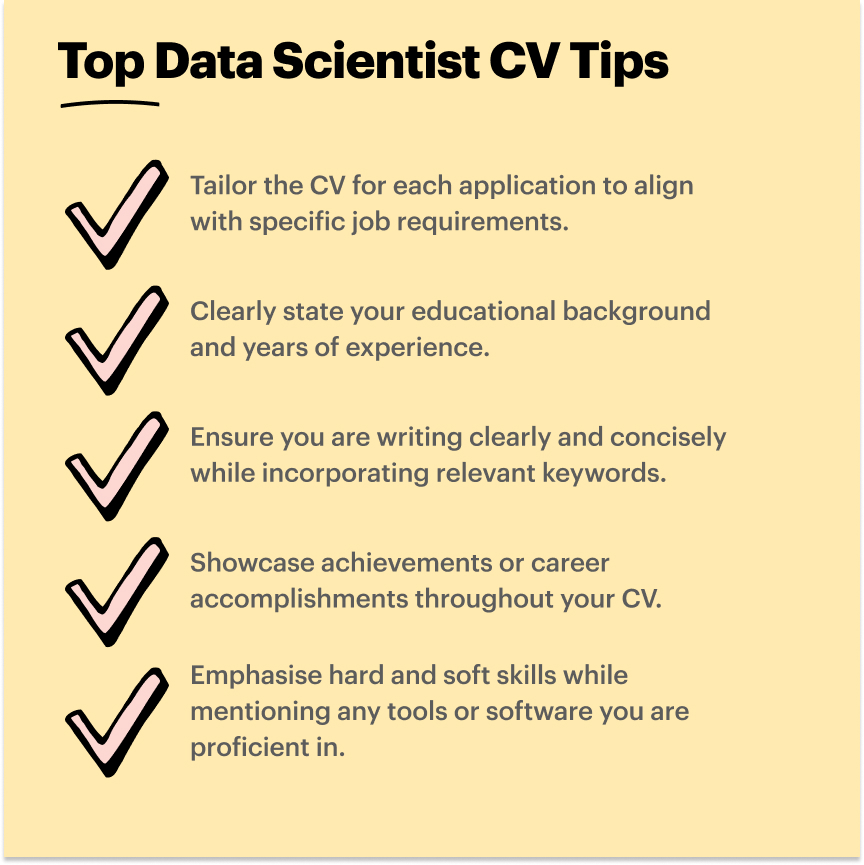
Next steps?
Explore our comprehensive CV Writing Service, which offers customisable templates tailored to your experience and career goals. For those needing more inspiration or are changing careers, browse our career blog for practical advice on achieving your dream role. For those targeting entry-level positions or with little experience, explore our specialised cover letter templates and job interview tips to kickstart your career journey.
Additionally, explore our blog article on the highest-paying jobs in the UK for more information on career prospects and average salaries based on your experience.
FAQs
What does a data scientist do?
Data scientists utilise statistical analysis, machine learning, and programming to interpret complex data, extract insights, and drive decision-making processes. They build predictive models, identify trends, and provide strategic insights for organisational growth and innovation in diverse sectors.
How to become a data scientist?
Becoming a data scientist typically involves earning a computer science, mathematics, or data-related degree. Acquire technical skills in programming languages (Python, R), statistical analysis and machine learning. Gain hands-on experience through internships, fast-track your career path with skill boot camps, or register with schemes like the civil service fast stream. Alternatively, browse DataKind UK or Reach Volunteering to learn how you can enhance your career prospects without previous experience.
Are data analysts and data scientists the same?
No, they are different, yet both involve analysing data. Data analysts interpret existing datasets to derive insights. Data scientists focus more on developing predictive models, creating algorithms, and handling more complex datasets. In contrast, data scientists require a broader skill set that involves machine learning and programming tools. Refer to the CV of a data analyst to learn more about this distinction. Or, explore a career as a data scientist on The Royal Statistical Society and Chartered Institute for IT website for more insight.
How much do data scientists make?
On average, entry-level or junior data scientists' salaries range from £25,000 to £40,000 annually. An experienced data scientist with substantial expertise can earn up to £70,000 per year, with salaries varying across industries and companies.
How do you become a data scientist without a degree?
You can still enter the field of data science without a formal degree by completing a course or a related subject. Build a strong portfolio through personal or academic projects and apply for internships. Enrol in coding bootcamps designed for quick upskilling to work in specific tech-driven sectors. Or, explore free computer science and coding courses on the Skills Toolkit website.

